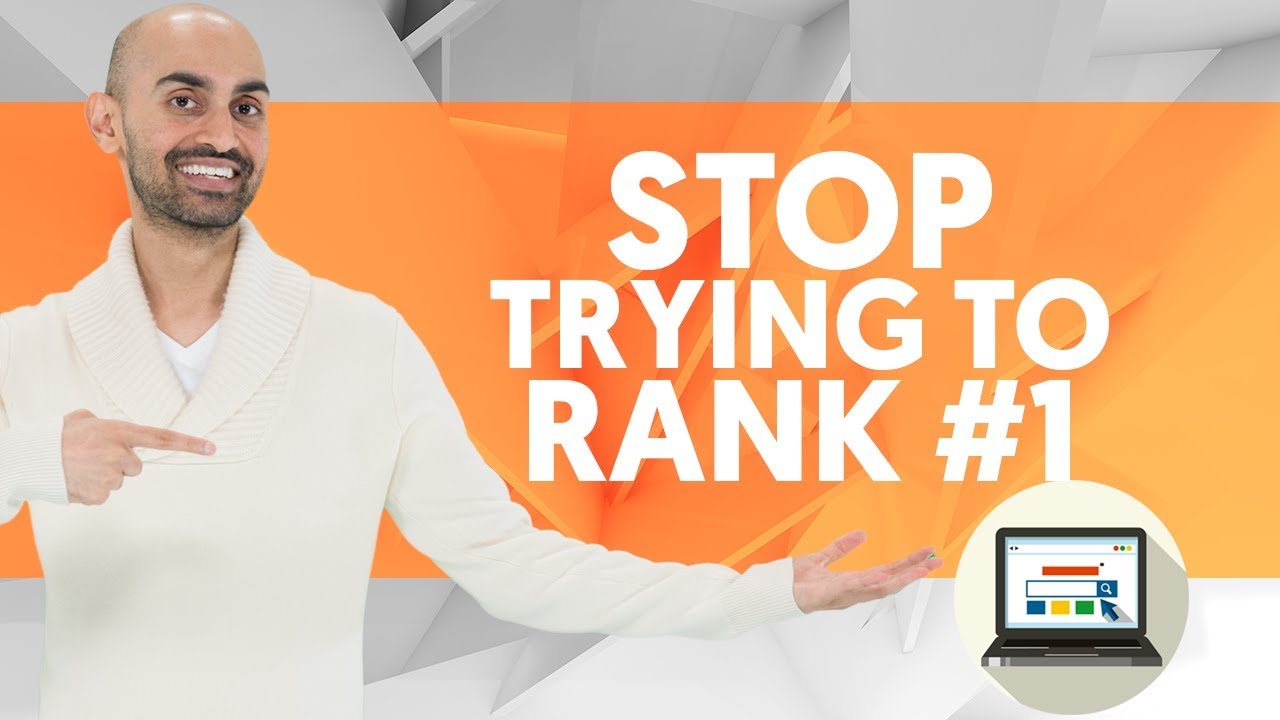Do Yourself a Favor: STOP Trying to Rank #1 For Keywords on Google (SEO Strategy 2019)
Search Engine Optimization Tips
Do yourself a favor: STOP Trying to Rank #1 For Keywords on Google // What if I told you that ranking number one on Google won’t necessarily make you more money? Today I’m going to share with you why you should stop wasting your time trying to rank number one on Google.
RESOURCES & LINKS:
____________________________________________
Ranking #1 With a New Website on Google in 2019 | Is it Even Possible? (video): https://youtu.be/91W0sa9Qfg8
SurveyMonkey: https://surveymonkey.com/
____________________________________________
Can you guess how many keywords I try to rank number one for? Zero.
I don’t even track my own rankings.
Now let me break down why you should try to avoid trying to rank number one on Google for a lot of terms.
First thing, one, rank tracking is really inaccurate. So when you think you rank number one, you may not rank number one. Every region has different results because of localized search. Every person, every state, every country is looking at different results based on how they search.
Google is trying to adjust the results to be personalized to each individual.
So it’s not about trying to rank number one, it’s about trying to provide The best user experience so more people want to see results from your site versus someone else’s site.
The second thing is ranking number one, doesn’t mean necessarily mean that you’re going to get most of the traffic.
Did you know according to Ahrefs, only 49% of the time, ranking number one gets you the most traffic? That means 51% of the time, all the other spots get the rest of the traffic.
It’s not about being number one, it’s about getting most of the traffic.
The third thing is, you don’t have to rank number one to get the most traffic.
For example, there are certain keywords that I rank, let’s say, Number 3 or number 4 for, like SEO tips, but yeah, I get more traffic than the number 1 listing because I take up the rich snippet.
If you take up rich snippets, you can also rank higher. So when people are googling for a term, don’t just think about, “oh I want to rank high, I need to build more links” “I need to do more internal linking”.
Make sure your content Addresses that term. And here’s what I mean by that.
If someone’s typing keywords like SEO tips, they’re looking for SEO tips. So your article may break down seven tips that can help them out and when you clearly define these tips, you’ll notice that you have a higher chance of being pulled in as a rich snippet and that’ll help you get more traffic than if you weren’t there.
The fourth thing is not all keywords have intent.
For example, I rank on Google for terms like online marketing, internet marketing, SEO. Those terms may seem amazing and they are competitive but guess how much revenue they drive?
Very little. Why? Because anyone who searches for those keywords is looking for basic advice. There’s no intent there. People who search for SEO are looking for, “Hey, what is SEO?” “How does it work?” “How do Google rankings work?”
Those warm people that aren’t going to pay me for my ad agency, but on the flip side, if I rank for ‘SEO agency’, I’ll generate way more revenue.
So in other words, you need to look for keywords that are intent based.
And last but not least, rankings won’t guarantee your success.
Here’s what I mean. If you do all the right things to get to the top, but yet no one wants to go visit your page, you’re not going to stay at the top.
A good example of this is Ahrefs was trying for a very long time to rank for backlink checker.
They created content, internal links, they did everything that’s possible to rank at the top, but no matter what they did, they weren’t ranking.
It wasn’t that their SEO was bad, it was that users didn’t care to visit their page. And the reason being is they were looking for a free backlink checker while their tool costs money.
Once Ahrefs figured out that, “hey, we’re not doing what’s best for the user” and they gave the skimmed down version of their tool for free and they only provide, let’s say, 100 links, I don’t know what’s the exact number is but it’s somewhere around there.
What they found is, their rankings shot up to the top of page 1. Why? Because they gave users what they wanted.
So even if you do all the right things to rank at the top, but you ignore the user, you’re not going to rank, you’re not going to convert them.
You need to understand what they want. And using tools like SurveyMonkey will help you get that information.
► If you need help growing your business check out my ad agency Neil Patel Digital @ https://neilpateldigital.com/
►Subscribe: https://goo.gl/ScRTwc to learn more secret SEO tips.
►Find me on Facebook: https://www.facebook.com/neilkpatel/
#SEO #NeilPatel #DigitalMarketing
Do yourself a favor: STOP Trying to Rank #1 For Keywords on Google // What if I told you that ranking number one on Google won’t necessarily make you more money? Today I’m going to share with you why you should stop wasting your time trying to rank number one on Google.
RESOURCES & LINKS:
____________________________________________
Ranking #1 With a New Website on Google in 2019 | Is it Even Possible? (video): https://youtu.be/91W0sa9Qfg8
SurveyMonkey: https://surveymonkey.com/
____________________________________________
Can you guess how many keywords I try to rank number one for? Zero.
I don’t even track my own rankings.
Now let me break down why you should try to avoid trying to rank number one on Google for a lot of terms.
First thing, one, rank tracking is really inaccurate. So when you think you rank number one, you may not rank number one. Every region has different results because of localized search. Every person, every state, every country is looking at different results based on how they search.
Google is trying to adjust the results to be personalized to each individual.
So it’s not about trying to rank number one, it’s about trying to provide The best user experience so more people want to see results from your site versus someone else’s site.
The second thing is ranking number one, doesn’t mean necessarily mean that you’re going to get most of the traffic.
Did you know according to Ahrefs, only 49% of the time, ranking number one gets you the most traffic? That means 51% of the time, all the other spots get the rest of the traffic.
It’s not about being number one, it’s about getting most of the traffic.
The third thing is, you don’t have to rank number one to get the most traffic.
For example, there are certain keywords that I rank, let’s say, Number 3 or number 4 for, like SEO tips, but yeah, I get more traffic than the number 1 listing because I take up the rich snippet.
If you take up rich snippets, you can also rank higher. So when people are googling for a term, don’t just think about, “oh I want to rank high, I need to build more links” “I need to do more internal linking”.
Make sure your content Addresses that term. And here’s what I mean by that.
If someone’s typing keywords like SEO tips, they’re looking for SEO tips. So your article may break down seven tips that can help them out and when you clearly define these tips, you’ll notice that you have a higher chance of being pulled in as a rich snippet and that’ll help you get more traffic than if you weren’t there.
The fourth thing is not all keywords have intent.
For example, I rank on Google for terms like online marketing, internet marketing, SEO. Those terms may seem amazing and they are competitive but guess how much revenue they drive?
Very little. Why? Because anyone who searches for those keywords is looking for basic advice. There’s no intent there. People who search for SEO are looking for, “Hey, what is SEO?” “How does it work?” “How do Google rankings work?”
Those warm people that aren’t going to pay me for my ad agency, but on the flip side, if I rank for ‘SEO agency’, I’ll generate way more revenue.
So in other words, you need to look for keywords that are intent based.
And last but not least, rankings won’t guarantee your success.
Here’s what I mean. If you do all the right things to get to the top, but yet no one wants to go visit your page, you’re not going to stay at the top.
A good example of this is Ahrefs was trying for a very long time to rank for backlink checker.
They created content, internal links, they did everything that’s possible to rank at the top, but no matter what they did, they weren’t ranking.
It wasn’t that their SEO was bad, it was that users didn’t care to visit their page. And the reason being is they were looking for a free backlink checker while their tool costs money.
Once Ahrefs figured out that, “hey, we’re not doing what’s best for the user” and they gave the skimmed down version of their tool for free and they only provide, let’s say, 100 links, I don’t know what’s the exact number is but it’s somewhere around there.
What they found is, their rankings shot up to the top of page 1. Why? Because they gave users what they wanted.
So even if you do all the right things to rank at the top, but you ignore the user, you’re not going to rank, you’re not going to convert them.
You need to understand what they want. And using tools like SurveyMonkey will help you get that information.
► If you need help growing your business check out my ad agency Neil Patel Digital @ https://neilpateldigital.com/
►Subscribe: https://goo.gl/ScRTwc to learn more secret SEO tips.
►Find me on Facebook: https://www.facebook.com/neilkpatel/
#SEO #NeilPatel #DigitalMarketing
source

